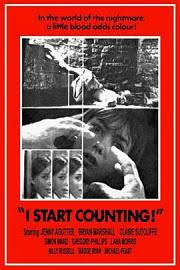
The story appears simple on the surface, but is revealed, especially after multiple viewings, as more multi-layered and textured than Cassavetes at his best. Ostensibly it concerns a 14-year old Catholic girl, Wynne (Agutter) growing up in this post-modern wasteland, who develops a crush on her much older adoptive brother (Marshall)- a crush which perversely deepens and grows into infatuation once she starts to believe he is the local sex killer. This is in itself an idea that makes you sit up and jolt, but as the narrative develops, it continues not necessarily along a linear path but in several confusing and fascinating directions: the family's history, (detailed effectively in chilling flashback during an improvised seance) is a chequered one, and has suffered at least one major relocation and upheaval in the last ten years. At the crux, however, it's the depiction of socialal changes that make I Start Counting so fascinating and elevate its language far beyond the confines of the standard horror film. The major subtext- that teenage girls were maturing more quickly than before, and developing full sexual and romantic appetites (even if in thought rather than deed) but were not possessed of enough discretion to make the right choices- was a step forward for a genre in which its young females had previously been portrayed as bimbo victims (Cover Girl Killer and The Night Caller spring to mind), but not one that all viewers would necessarily agree with. But most striking of all, and possibly the most enduring image which the viewer will take away with them, is of the masterful symbolism with which director Greene invests every shot. Every inch of the Kinch family's world- their house, their walls, their TV, Agutters underwear, bedroom furniture and toys, Sutcliffe's clothes, Marshalls van, the local Catholic church, their town centre, their record shop) - is painted a bright, scintillating white- a white which, by inference, is slowly becoming smudged and corrupted with the dirt of the outside world. White also symbolises, of course, purity and innocence (two qualities Catholic schoolgirls are supposed to hold dear), and it is into this world of innocence that the ever-present red bus (a symbol of violation and penetration), conducted by the lecherous yet similarly juvenile Simon Ward, makes regular journeys. The allegory is further expanded in one scene where Agutter believes she sees the Christ figure in church weeping blood: by the time we acknowledge it, its gone, but the seed has already been planted. Rarely in a genre production has the use of colour and background been so important or effective in creating a uniformity of mood. I Start Counting is as near-perfect an end to a decade as one could hope for, and exactly the kind of film people should be making now- which is, of course, exactly why they never will. A genre essential. by D.R.

After an embarrassing and meijubar.net public breakdown, Detective Aidan Black (David Sutcliffe) is reassigned from his beloved SWAT team to the newly created Psych Crimes and Crisis Unit. There, he's dismayed to find his partner is not another cop, but forensic psychiatrist, Dr. Daniella Ridley (Stefanie von Pfetten). The unit also includes Detective Poppy Wisnefski (Luisa d'Oliveira) and psychiatric nurse Leo Beckett (Dayo Ade), with Inspector Diane Caligra (Karen LeBlanc) keeping a close watch over the unique partnerships. Passionate and opposing viewpoints are an inherent part of the job in Psych Crimes, and the answers the teams seek never come easy. Aidan's deep insight and investigative skills combine brilliantly with Daniella's keen ability to decipher human behaviour. Learning to work cohesively, the Psych Crimes and Crisis Unit investigates city's most troubling and psychologically complex crimes. Whether or not the unit is still around in a few months...
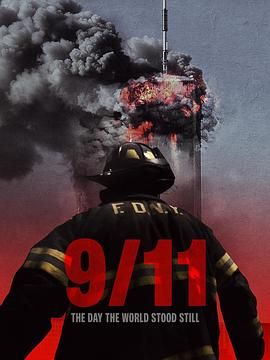
It had been a crisp September morning like so many others. And then it was not. An explosion of evil would carve a path of death and destruction. The untold stories of resilience and unity from survivors pay tribute to hope amid tragedy.
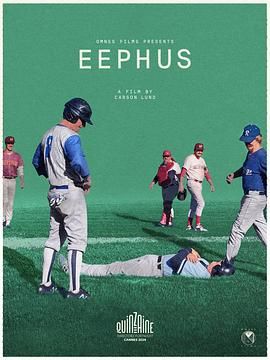
讲述了新英格兰一个休闲联赛的最后一场比赛。在他们心爱的球场即将被拆除之前,我们跟随着这群成年人的幽默和隐晦的感伤,比赛持续到加时赛,白昼渐渐消逝为夜幕,标志着一个时代的终结。
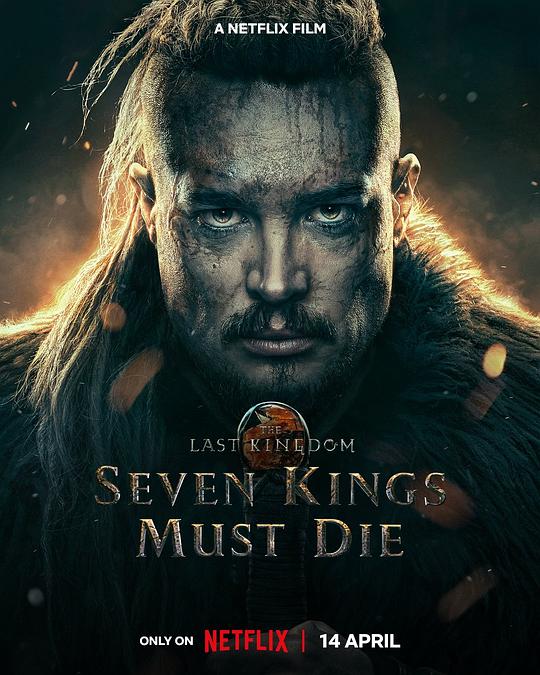
电视剧《孤国春秋》的续作,根据原著小说最后三部改编。主人公乌特雷德将辅佐埃塞尔斯坦登上王位并统一英格兰。“七位国王会死,贝班堡的乌特雷德,七位国王和你所爱的女人,(……)那是你的命运。阿尔弗雷德的儿子不会统治,威塞克斯会死,撒克逊人会杀死他所爱的人,丹麦人会获得一切,一切都会改变,一切都会像过去一样,将来也会一样。”——Ælfadell
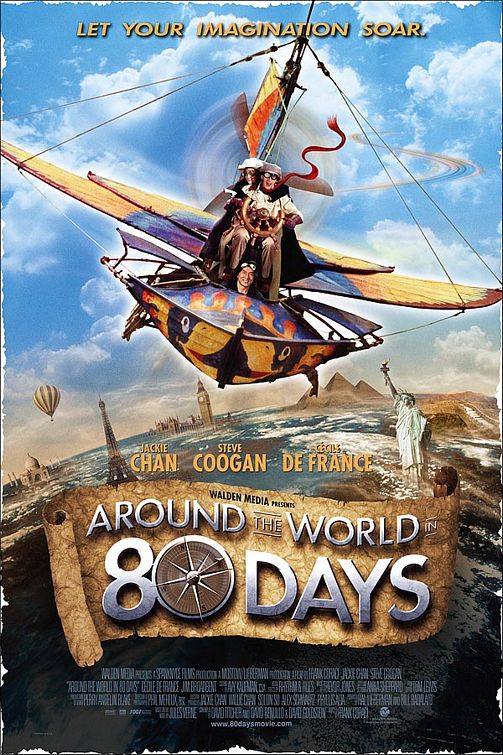
19世纪后半期,科技发展持续推动着工业的进步。在伦敦,醉心发明的科学家福格(SteveCoogan饰)经常进行疯狂的运输工具实验,尽管,他得不到皇家科学院的认可,只是一名业余爱好者,仆人也因过于危险的实验离他而去。来自中国的刘星(成龙饰)为取回家乡的宝物“玉佛像”,打劫了英格兰银行。招来了英国警方与中国犯罪组织黑蝎集团的无休无止追捕,无奈之下只得化名“路路通”担任福格的仆人。福格为取代古板不堪的科学院院长,赌上全部家当与前途,要在80天内环游世界。而路路通认为可借这次旅行将佛像送回家乡。两人出发后在巴黎遇见痴迷印象派的业余女画家罗切(CécileDeFrance饰)要求同行,他们怀着不同的目的乘上“东方快车”号。虽然前路有土耳其王子(ArnoldSchwarzenegger饰)、黑蝎芳将军(莫文蔚饰)与手下(吴彦祖饰)的重重拦截,但怀揣梦想的三人不会畏惧任何险阻。
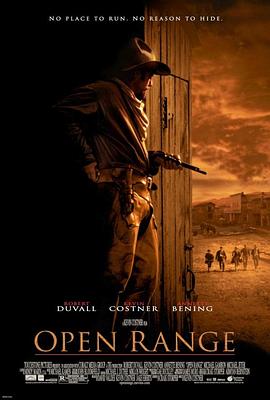
故事发生在1882年的美国西部平原,在那片广阔的土地上,生活着名为“拓荒者”的人们,他们自由的选择土地,辛勤劳作,放牧牛羊,安居乐业,查理(凯文·科斯特纳 Kevin Costner 饰)、苏(安妮特·贝宁 Annette Bening 饰)、莫斯(亚布拉哈姆·本鲁比 Abraham Benrubi 饰)和斯皮尔曼(罗伯特·杜瓦尔 Robert Duvall 饰)正是其中的成员。
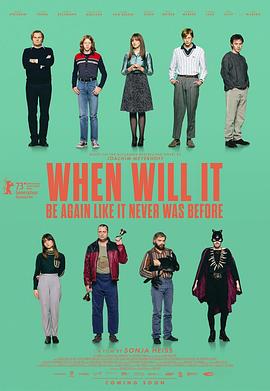
Joachim是家中老三,常遭两位哥哥作弄,往往情绪失控,幸好父亲是精神病院的院长,对他照顾有加。这所院舍专门照料青少年病人,以康服而非囚禁作为目标,是当时德国最先进的有关设施。Joachim在这环境长大,让他有一个不一样的童年。他一家视病人如家人,使他体会到所谓「正常」与否只是一线之差。视频透视主角从小孩至成年的印记,描绘他经历初恋、父母离异和出国等,各种人生片段有喜有悲,但黑色幽默的风格贯彻始终,一众专业和业余演员,包括精神障碍人士的演出尤其出色。
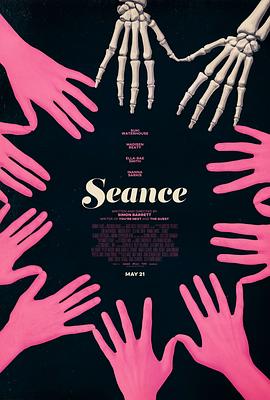
Camille, a young woman who arrives at the Fairfield Academy following one of the student's untimely and violent death.
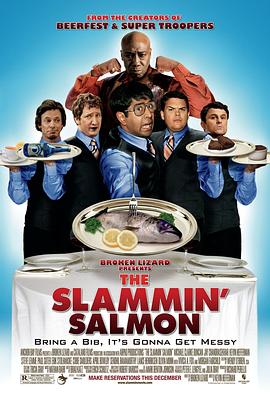
克里昂(迈克·克拉克·邓肯 Michael Clarke Duncan 饰)曾经是一名脾气火爆的重量级拳击冠军,退役后开了一家拳王餐馆,他的凶悍作风让员工们都闻风丧胆,不敢造次。然而在一次日本白化动物猎捕活动上,克里昂与一位日本人打赌谁捕得多,结果却输得一塌糊涂,并要在第二天交出两万块,否则餐馆将被接管。要在一夜之间赚够两万块简直不太可能,要知道餐馆销售最高周记录也不超过一万五美金,为了免遭克里昂的铁拳惩罚,可怜的服务员们开始绞尽脑汁,使尽浑身解数,誓死掏空客人钱包……